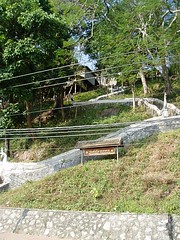
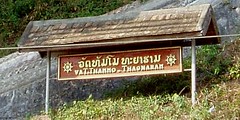
...& ascend by a path between some wooden houses further southwest. Two years later the cat would discover that its chosen path lies somewhere near the site of Wat Pa Meo (lit. temple forest cats), one of the 12(*) temples on the slopes of Phou Si, of which only five are still extant. Wat Pa Meo supposedly got its name because 'villagers use to leave their cats over there'...
Paintings drying on shrubs outside someone's kuti:


Phommathat Rd - still hazy, but clearer views than the previous evening:
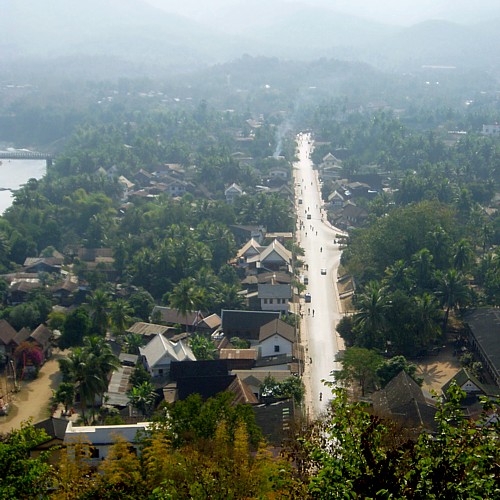
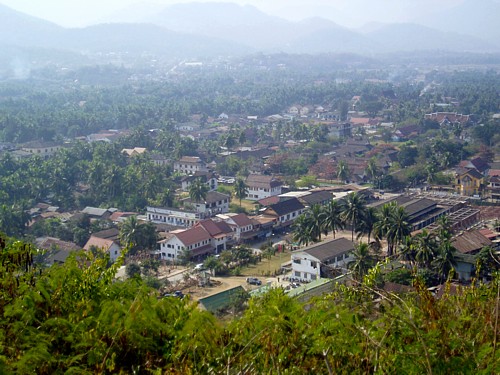
During this 2006 visit, Talat Dala was being rebuilt, & the province hospital had already been shifted out of the old site diagonally across from Talat Dala to Chinese-built premises south of town:
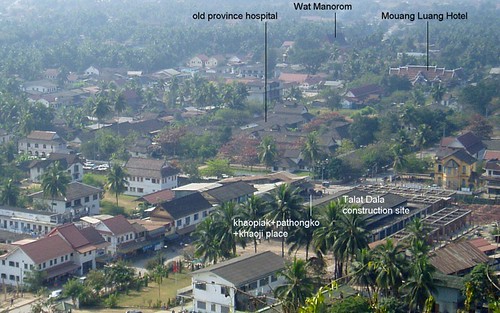
Click here to see full size image
During the 2008 visit, Talat Dala had been completed & reopened, & the old province hospital was being converted by Aman Resorts into yet another luxury hotel. The latter development was mentioned in a not exactly favourable manner in the 2007 report of the UNESCO WHC-ICOMOS reactive monitoring mission to the Luang Prabang World Heritage Site, which has this to say about the ongoing Disneyfication & gentrification:
At present, however, unprecedented pressure from development is posing new strains on the site which the existing conservation system appears unable to counter effectively. If the Lao traditional heritage, in particular, continues its steady decline, the Town of Luang Prabang is heading towards a situation that would justify World Heritage in Danger listing...
Illegal constructions and rapid land use conversion represent a growing threat to Luang Prabang’s significant intangible cultural heritage and to the spirit of the place (genius loci)...With the movement of local residents out into more peripheral areas and their replacement by tourists and commercial entrepreneurs, the continuity of attachment to place will be lost...
Gentrification by expatriate Europeans or by the Lao themselves may save the physical fabric, but it tends to work against maintenance of the intangible heritage, except in highly commercialised forms such as fine arts, exotic crafts and tourism performances.
(How the cat wishes there was some big-fat-clout organisation to knock this into the Singapore government for what they have done to sterilise + ruin places like Chinatown in the name of tourism.)
During its 2008 visit, the cat also discovered that its favourite roadside khao piak khao (porridge) + pathongko (fried dough fritters) breakfast place had disappeared - the house in front of which it sprouted up every morning had been torn down & was being rebuilt. Too tired to hunt it down, it turned to the busy place opposite Talat Dala that does the same thing (for double the price).
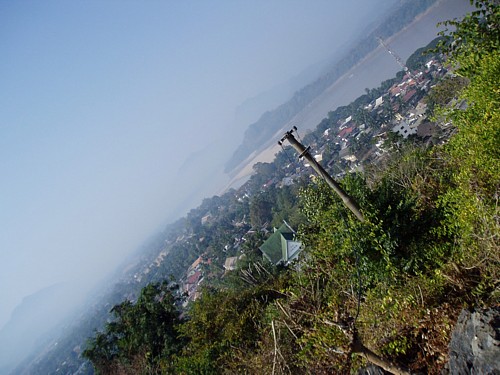
The multi-storey Ancient Luang Prabang Hotel sticks heads & shoulders above the surrounding buildings & trees in the World Heritage conservation zone:
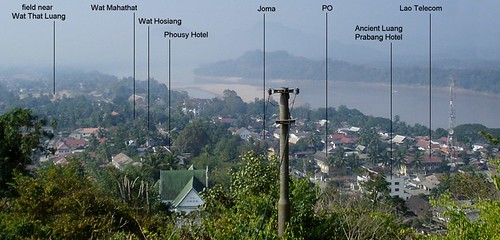
Click here to see full size image
Chomphet district on the opposite bank of the Nam Khong:
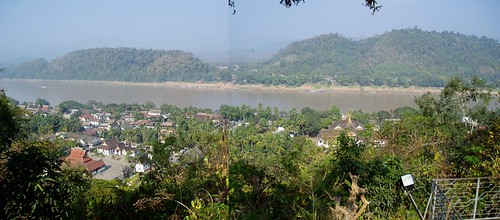
Click here to see full size image
In 2008 the governor of Luang Prabang would sign an MOU for a USD2 billion project (article source: Vientiane Times 231008) by Korean & Lao investors to transform Chomphet district into Diamond City, a new town with shopping malls, resorts, business service centres, a 36 hole golf course & a stock exchange on 3000ha of land to be leased for 50 years (extendable for an additional 20 years), & also a bridge across the Nam Khong to link up with Luang Prabang town. Prior to this, there were also plans to build such a bridge to connect the town to a proposed new airport in Chomphet district to be built by Chinese investors. So much for the 2007 UNESCO WHC-ICOMOS reactive monitoring mission report, which states that:
It is now urgent to revise the town’s urban plan and, as part of that, to identify a buffer zone to prevent inappropriate development that would negatively impinge upon the characteristics of the historic urban landscape. In the meantime, a stop should be put to...the development of a new town on the right bank of the Mekong...
A moratorium should be imposed immediately on major projects impacting on the OUV (Outstanding Universal Value) as outlined particularly in Section 4 above, and will extend until completion of the revised Urban Plan. This will include the new town in the Chompeth valley on the Mekong right bank...
Timeline: Immediate imposition of moratorium and notification of such to the World Heritage Committee by 1 March 2009.
Wat Mai:

Royal Palace museum:
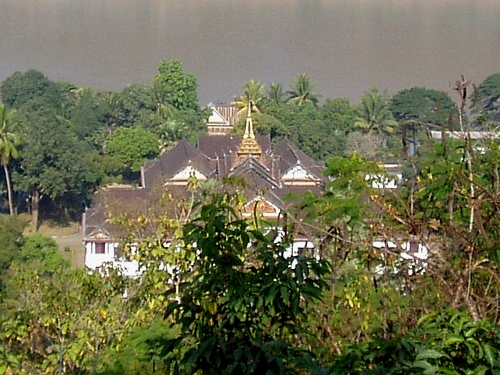
Whether khon Lao & falang alike will continue to enjoy these views from Phou Si depends on whether these protective measures put forth in the report will ever materialise, & be effectively enforced:
(a) Chompeth valley – protection of agricultural activities; maintenance of
drainage systems; density and height control restrictions on any new buildings;
(b) Mekong downstream – protection of vista along river banks and up to crest of visible mountains;
(c) Wetlands – protection of agricultural activities and vegetation; any further residential development to be low density and low rise;
(d) Nam Khan valley and mountains – protection of sweeping vista from Phousi along the Nam Khan to the crest of mountains; restrictions might be limited to height control and preservation of vegetation cover.
Notes:
(*) Twelve temples on the slopes of Phou Si:
- ວັດຊຽງງາມ Wat Xieng Ngam aka. ວັດປ່າຝາງ Wat Pa Fang
- ວັດປ່າແຄ Wat Pa Khae aka. ວັດສີພູດທະບາດເຫນືອ Wat Siphoutthabat Neua
- ວັດປ່າຣວກ Wat Pa Houak
- ວັດທັມໂມ Wat Thammo
- ວັດຈອມສີ Wat Chom Si
- ວັດສາວຫລຽວ Wat Sao Liao (gone)
- ວັດປ່າທຽບ Wat Pa Thiap (gone)
- ວັດທ້າຍພູ Wat Thay Phou (gone)
- ວັດຫໍຄ່ວງ Wat Ho Khouang (gone)
- ວັດທາດເນີ້ງ Wat That Noeng (gone)
- ວັດຂາມລ່ຽມ Wat Kham Liam (gone)
- ວັດປ່າແມວ Wat Pa Meo (gone)

No comments:
Post a Comment